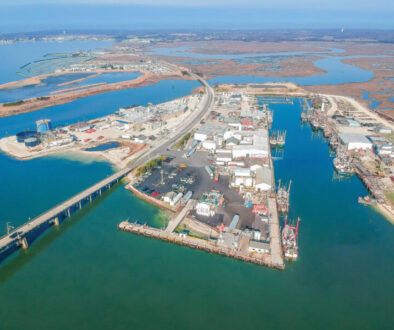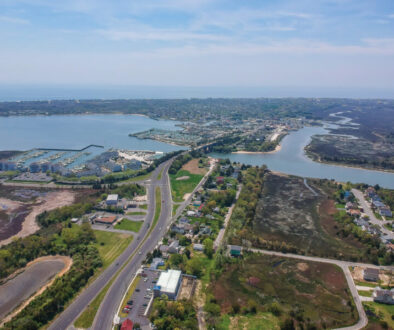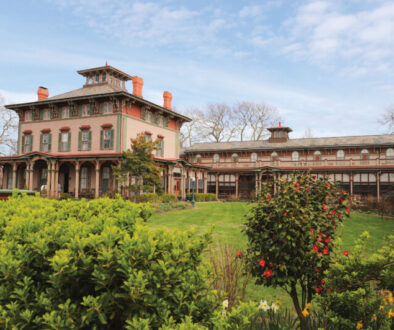Every Body’s Beach Town
Cape May Embraces Visitors of All Abilities

This is a story about accessibility in Cape May. It starts out, however, not in Cape May, but braced halfway down an alarmingly steep, narrow staircase at a bed and breakfast on Ocracoke Island, North Carolina.
It’s 4:30am and that’s me, descending the staircase backwards and securing myself after each progressive step. Directly behind me is my 85-year-old mother, methodically navigating each stair, holding tightly to the carved wooden bannister, while her wheeled stroller waits at the bottom. Of all the experiences we’d had on our weeklong “Spring Break Road Trip” along the coast, somehow it was this moment that made me viscerally aware of how isolated and dangerous it was to be picking our way down these stairs in the wee hours of the morning to make the first ferry off the island, and yet how empowering it was that we were doing it. Dammit, no matter what happened on these stairs, we were out here, living our best lives, throwing caution to the wind. And it was glorious.
Those stairs marked a turning point in my life. Here was my tiny, spunky mother staring down her age (and her unpredictable “woozy” episodes) and fighting back against the narrative depicted on the inside of assisted living facility brochures everywhere. It dawned on me: Shouldn’t everyone have this opportunity?
In Cape May, the answer to this question is a resounding “yes.” Thanks to accessibility initiatives at the local level and beyond, this community welcomes everyone, including those who just need extra accommodation to create their beach memories.
Wheels of Freedom

In 1991, the Cape May Beach Patrol introduced its first two “surf chairs,” those ubiquitous PVC wheelchairs with enormous gray tires that sit poised next to nearly all of the ramped beach access points. Today, a 30-strong collection covers the two-and-a-half-mile beachfront that spans Poverty Beach to the Cove. They are available for daily use during spring, summer, and fall—free of charge—on a first-come, first-served basis.
“The salt air and beautiful sunshine—these chairs make it accessible to people who previously couldn’t enjoy that,” says Geoff Rife, who has served with the Beach Patrol for 35 years, the last three as captain. “These chairs make it accessible to people who previously couldn’t enjoy that. It ranges from ‘my uncle broke his ankle’ to the elderly person who can’t walk on sand but wants to spend the day on the beach with grandchildren. People with cerebral palsy can enjoy the natural environment down here.”
“Repeat customers,” as Rife calls them, visit Cape May year after year, including a Pottstown man who is paralyzed from the neck down. Every summer, he and his family borrow a chair for two weeks, a routine that has nurtured a friendship with the guards who sit on that same beach each summer. “The family all know us by name,” says Rife. “For them, it’s more than just a daily routine—it’s second nature to help them into their chair.”
The iconic design of the chairs hasn’t changed much over the years: large, low-pressure polyurethane wheels float over soft sand and support a corrosion-resistant PVC frame with a padded seat cushion. Newer models sport a footrest and a larger and deeper frame size than their predecessors, providing more comfort and versatility.
With a $1500 price tag, city officials didn’t jump in all at once. “We had to go out and solicit donations from private organizations and individuals to get those first two chairs,” recalls Rife. “But when the city saw the need, and that it was allowing handicapped and injured folks to go to the beach, more money was allocated in the operating budget to purchase additional chairs.” Committed to the project ever since, Cape May today owns more surf chairs than any other beach in South Jersey.
What about visitors who may be intimidated by the process? “The very first thing I would tell them is that they’re not the first family to have those feelings,” Rife counsels. “Other people have had those fears, but they came here and had a wonderful vacation. We’re here at Beach Patrol Headquarters every day for roughly five and a half months. If they have fears or questions, we ask them to please call or email us. Or bring the family down to the promenade and ask any lifeguard or lieutenant ‘what’s the story with these beach chairs?’”
Life Rolls On
“Words can’t describe seeing freedom in people’s eyes that don’t have it every day,” says Chad deSatnick, founder of The DeSatnick Foundation, a 501(c)3 nonprofit organization offering emotional and financial support to individuals who live with or received spinal cord injuries (SCIs) in Atlantic, Cape May, Cumberland, and Ocean counties. The organization unites those who have suffered SCIs with first responders, business owners, visitors, and residents of the greater Cape May community, allowing them to get out and experience life.
After suffering a spinal cord injury while surfing in September of 2001, deSatnick became an event coordinator for East Coast programs with the Life Rolls On Foundation. “After seeing a need to offer support for those individuals that suffered SCIs in the area, we realized that we could help them and their families,” he says. Life Rolls On has hosted They Will Surf Again, an annual adaptive surfing event in New Jersey, and has also organized a golf tournament for the last 10 years.
The DeSatnick Foundation stages the annual Cape to Cape Paddleboard Race across the 16 miles from Cape Henlopen to Cape May. Each participant must raise money to supplement the $250 entry fee. “Last year, a few of our participants raised over $2800 each, so it became a ‘FUNdraising’ competition in itself,” explains deSatnick.
“Although participants are competing to be the fastest paddler,” he continues, “the real winners are the individuals who’ve suffered spinal cord injury, because all of the proceeds go directly to those in need.” Since the Foundation’s inception, volunteers and business owners have donated their time and services, allowing the Foundation to offer money to those who need it. “We’ve helped individuals living with paralysis purchase power wheelchairs and lifts to help them get in and out of their chairs to bed, helped to adapt and retrofit their vehicles, and funded therapy programs.”
This year also marks the inaugural Four Mile Cape to Cape, from Cape May Point to Cape May. “We’re super excited to announce that some of the adaptive athletes will be paddling the shorter event,” he says, noting that the race will also be less of a financial commitment for paddlers.
Fundraising is one goal of the DeSatnick Foundation, but there’s another equally important, albeit less tangible one: inspiration.
In July 2017, Dennis Miles was vacationing here with his family. On his last day before driving back to Ohio, he headed to the beach with his brother. “After playing a variety of beach games and building up quite a sweat, my brother and I decided it was time to jump in the ocean,” he recalls. “Five minutes later, BANG! I got lost in a huge wave in the shallow surf that took me headfirst into an infamous Cape May sandbar.” Miles found himself floating face down, completely paralyzed.
A rescue, an ambulance ride, and a flight later, Miles landed in the ICU in Atlantic City. Two surgeries repaired and stabilized the broken neck that left him a quadriplegic. The 10 days he spent in the hospital awaiting a medical flight to begin his inpatient rehab in Dallas were tough. “I grew extremely frustrated, scared, and emotional,” he recalls, “and so many more internal feelings that would be impossible to verbalize. Let’s just say the adjustment to a motionless lifestyle is an impossible feat that many people have to overcome on a daily basis.”
It turns out that Miles’ family’s Airbnb host knew a guy with a very similar story: Chad deSatnick. And he paid a visit.
“Chad’s words and encouragement were invaluable to me in my personal recovery,” recalls Miles. “Perhaps the single biggest aspect of our two-hour conversation was that, by appearance, it looked like he had conquered his recovery, and that I too could one day stand on my own two feet and be, as stated by Chad in that first conversation, a positive recovery statistic and prove the medical community wrong.”
Miles contemplates the dynamic that exists between the medical community and those afflicted with a spinal cord injury. “Some of the most positive people that I’ve come across in my recovery are the injured, while the medical professionals around us seem to try to curb one’s enthusiasm about their potential of further recovery,” he says. “So rather than listening, I chose to find an alternate route that is inspired by people who have found themselves in similar positions.”
At this point in his recovery, “Healing is definitely a slow and unpredictable process,” Miles says. “But I’m proud to say that I’m now taking steps and still working towards my ultimate goal of living completely independently. Recovering from a spinal cord injury, both mentally and physically, is like entering the abyss,” he offers. “I’ve gotten stronger every month and have the goal to continue this improvement trend for the rest of my life. Foundations like Chad’s play a pivotal role in achieving goals with their financial and inspirational support.”
Chad and the DeSatnick Foundation remain committed to the cause, with plans to raise as much money as possible to continue financial support of those living with paralysis. “Accidents will inevitably happen,” deSatnick surmises, “but the Foundation can offer support to the individuals, family members, friends, and caretakers.”
Around Town

Cape May is known for its lovely Victorian architecture and rich history, but many of the features that give buildings their charm can also make them difficult to navigate for guests with mobility issues.
From her vantage point as Marketing and Events Director for the Chamber of Commerce of Greater Cape May, Doreen Talley sees the demographic of visitors changing. “A lot of the tour buses that come in have many seniors who use walkers and strollers,” she says. “We do our best to accommodate them.”
Many of the hotels and motels have lifts for moving individuals back and forth from their wheelchairs. At the Victorian Motel on Congress Place, a special poolside lift even allows guests who use wheelchairs to go swimming, a feature they adopted prior to Americans with Disabilities Act (ADA) regulations requiring it. “With several guests with various degrees of mobility issues, the lift made it possible for people who would not normally use the pool to swim with other guests,” says Victorian manager, John Cooke. “The expression on a wheelchair-bound guest’s face while they are easing into the water is very comforting and satisfying.”
Last year, the Victorian also installed a barrier-free shower enclosure in one of their rooms, making the bathroom 100 percent ADA compliant. The renovation also includes a transfer bench for guests who need to sit in the shower.

Other venues with accessible accommodations include The Capri and The Montreal Beach Resort, both on Beach Avenue. The Chalfonte Hotel has a ramp, as well as a porch wide enough for people using wheelchairs or walkers, along with an entirely accessible main floor.
“Some places do it well,” Talley reflects. “But in some cases, accommodating travelers in wheelchairs would require them to widen doorways and hallways.” A handful of inns do have larger areas, including Angel of the Sea, a location Talley recently observed accommodating with ease a woman with mobility impairments.
It’s not just lodging venues that have been getting accessibility makeovers; restaurants have gotten in on the action. Fins Bar & Grille incorporated an elaborate wheelchair lift in their design on the Carpenters Lane side of the building, allowing users to roll their wheelchairs in and be lifted from street level up to the porch.
Accessibility updates, including the ever-increasing number of ramped sidewalks, do not go unnoticed by those visitors who make a yearly pilgrimage to the town. “I see the same woman who comes in the Welcome Center every year on a bus trip,” remarks Talley. “She has a bright pink wheelchair. She told me, ‘You’re making some decent strides here.’”
Out in Nature
Cape May has so much more to offer than the beach and the downtown. Brendan Schaffer is a Teacher Naturalist and Summer Camp Director at New Jersey Audubon’s Nature Center of Cape May on Delaware Avenue. “It’s our mission to foster environmental awareness and a conservation ethic among all visitors to the nature center, regardless of disabilities,” he says. “We look to help people have meaningful experiences with nature, hoping they’ll do their best to help protect it.”
Regular programs run throughout the summer, with camps for children and family programs. “We ask if there’s any special attention needed with children and work directly with the families to accommodate any special care,” notes Schaffer. “We also permit aides to stay with a child if needed.”
The Center offers a host of special programs, including one designed for groups comprised of people with Alzheimer’s disease and their caretakers. “It’s called the ‘Memory Café,’ and we offer a pre-scheduled program with some of our animals, after which we do a tactile craft that is educational and fun.”

A favorite experience for Schaffer occurs during the Center’s Harbor Safari, where students sometimes have trouble verbalizing their thoughts and feelings or are afraid to touch a fish in a net. “By the end of the program, we’re able to show them there was nothing to fear and have gotten some smiles and laughter when they’re able to run a finger down the scales of the fish.”
Occasionally, groups will arrive at the Center on a day without a scheduled summer program. “If we’re able to spare a naturalist,” he says, “we’ll give these groups a tour of our facilities and an experience with some of our animals up close. It’s always best for groups to call ahead of the visit so we can be prepared. We have ramp access to our buildings and there is much to see and explore here for everyone.”
A different type of nature experience is offered through Cape Sea Excursions, which arranges accessible seafaring adventures from fishing to whale watching. Their whale watch and research boat can accommodate people with various disabilities. “When they have advance notice, they can cater to special needs, including sight and sound,” says Talley. “They’ve hosted many children with special needs, and they like to talk with families ahead of time so that they can accommodate the entire family.”
The Way Forward
Geoff Rife predicts that inclusivity efforts will continue to expand. “We’ve got 15 beach patrols in the South Jersey Chiefs Association, and no matter what beach, they all have surf chairs. I know from going into chiefs’ meetings, everybody tries to grow their numbers of beach chairs every year.”
It’s a community thing. A competitive swimmer in high school and college, Rife found the Beach Patrol a natural fit for a summer job, which evolved into a lifelong career. “I fell in love not only with the job and lifeguard competitions, but also the people who live here and who frequent the town as visitors.”
“This community is like no other,” affirms Chad deSatnick. “The dedication, volunteerism, and charitable mindset makes planning events very easy. John Lynch, a good friend of the DeSatnick Foundation who’s also had back surgery, uses the term ‘Power of Community.’ None of what we do would be possible without the support of our community members.”
Rife agrees. “When you see anybody—an elderly person who can’t physically walk down to the beach, or a child with any type of disability—going to the beach, or when you hear a person say ‘this is the first time my son has seen the ocean,’ it’s humbling.”
Pausing for a moment, Rife collects himself. “It’s just the right thing to do. It’s kindness. It’s inclusiveness. When you see the faces of the people using them, or the joy of family members just trying to enjoy a normal day at the beach…” he trails off. “We are very proud of that.”



